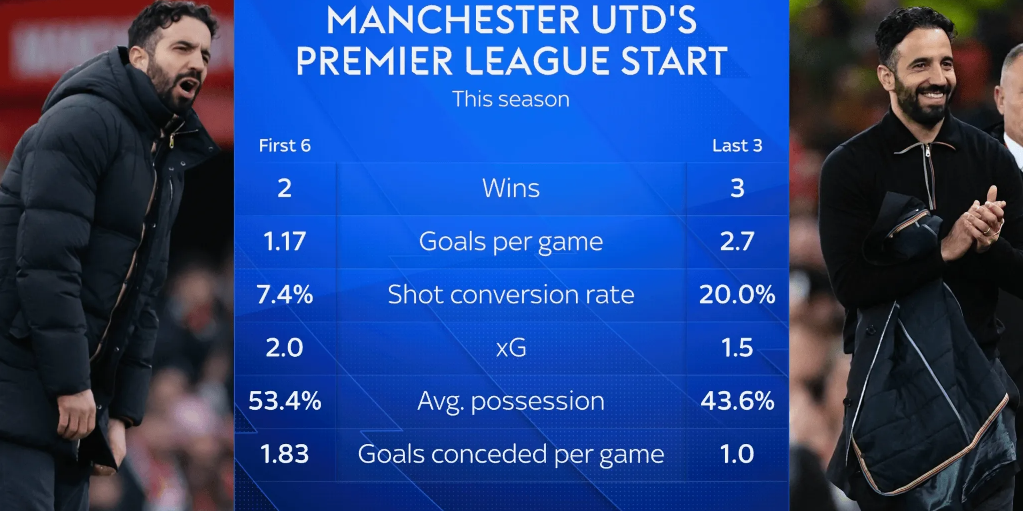Man Utd Satisfied with Amorim’s Coaching, Will Be Content If He Guides Team to Top 6 in League This Season


Camel.live experts talked about Manchester United's performance in recent matches. In addition, Manchester United executives hope that head coach Amorim can lead the team to secure the first six spots of this season, ensuring their qualification for European competitions next season.
Manchester United’s management is cautiously satisfied with the team’s progress of securing three consecutive wins for the first time in 18 months, but they clearly recognize that the club still has a long way to go to stably rank among the top of the league.
There was no celebration banquet in the administrative office at the Carrington Training Ground for the recent good results. Instead, this winning streak made the club’s top management convinced that the difficult decisions made earlier are showing results on the field, further strengthening their belief in implementing the long-term plan.
Head coach Ruben Amorim has set qualifying for European competitions next season as a goal, and CEO Omar Berrada and Director of Football Jason Wilcox will undoubtedly be content with a top-6 league finish. As Amorim continues to build the team, the entire club is fostering a mindset of remaining calm in both prosperity and adversity—neither overly excited in good times nor overly frustrated in bad times.
The key point is that despite the continuous external calls for a big-spending spree in the winter transfer window, the management is still determined to stick to the established strategy. Manchester United is not expected to make large-scale signings in the new year. After focusing on strengthening the forward line in the summer window, a defensive midfielder has become a priority target for squad upgrades. However, due to the huge investment required for a No. 6 position signing (Elliot Anderson, Adam Wharton, and Carlos Baleba are all on the candidate list), this position is more likely to be addressed in the summer window, when a comprehensive assessment will be conducted based on the overall squad structure and salary system.
The squad streamlining strategy in the summer has achieved remarkable results, with many high-salary fringe players excluded from Amorim’s plan. But the club also clearly realizes that the future of several core players is still uncertain: although Marcus Rashford is determined to leave, he still has two and a half years left on his contract; Harry Maguire and Casemiro’s contracts expire this summer, and letting either of them go will free up a huge salary space; and the mandatory buyout clause for Rasmus Højlund’s transfer to Napoli will only be activated if the Serie A team secures Champions League qualification.
These factors will all affect Manchester United’s transfer operations, but the club is determined to avoid repeating past mistakes—too many high-salary stars eventually became spectators in the stands at Old Trafford.
The strategy of focusing on strengthening the offensive end in the summer window has initially shown results. Although the expected goals (xG) in the last three matches are lower than those in the first six rounds of the season, the data reveals a significant improvement in the team’s finishing efficiency—this month’s shot conversion rate is as high as 20%, a qualitative leap compared to the previous 7.4%.
The tactical style has also quietly adjusted: the possession rate in the last three matches has dropped to below 44% (the season average is 53%), and goalkeeper Senne Lammens’ long pass ratio is as high as 85% (compared to 43% and 56% during the Onana and Bayindir periods respectively). The 23-year-old goalkeeper’s save success rate is 78.6%, which is more than 11 percentage points higher than Onana’s and over 25 percentage points higher than Bayindir’s.
The use of formations also shows flexibility. Although the three-center-back system is maintained, recent matches indicate that the Portuguese coach is adopting a more flexible defensive strategy: the wing-backs often drop back to form a four-back defense line.
A positive atmosphere is gradually taking shape inside Carrington. According to past practices, the dressing room would have been filled with conflicts after the loss to Brentford last month, but this time there were no reports of players’ dissatisfaction or doubts about the head coach, indicating that the team is in an unprecedented state of unity in recent years, and all members have a high degree of recognition for the tactical system.
Manchester United’s management is well aware that the reconstruction is still in its initial stage, and the road to stability and glory will inevitably be accompanied by hardships. But at least for now, under the quiet surface of Carrington, there is a firm belief surging—the core of power is convinced that the giant ship is sailing in the right direction.
